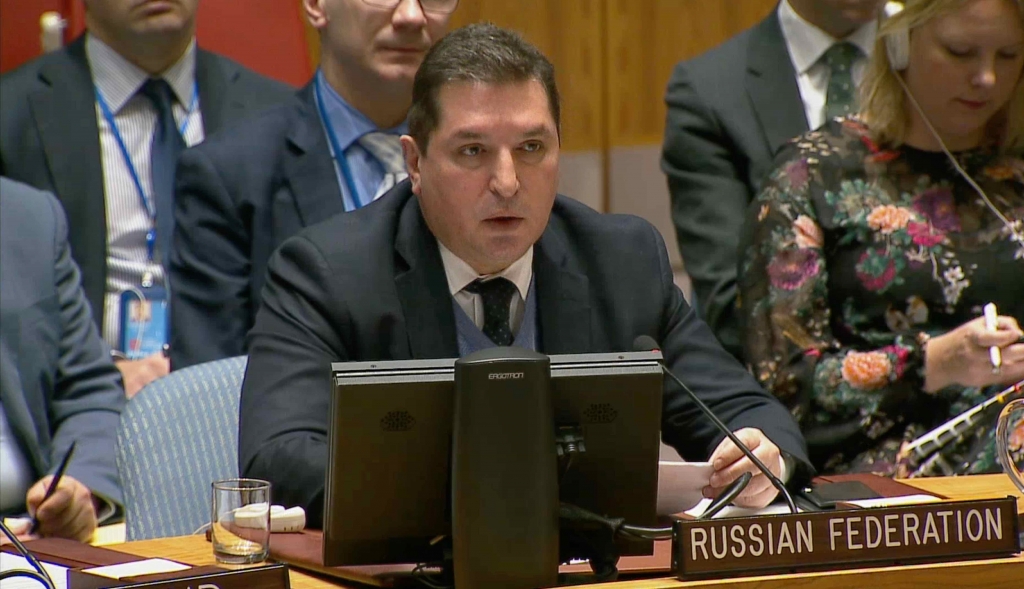Statement by Deputy Permanent Representative of the Russian Federation to the United Nations, Mr. Vladimir Safronkov, at the Secutiry Council meeting on the situation in Libya
We thank Mr. Salamé for his briefing.
We very much appreciate his professionalism and diligent efforts in the work of restoring the Libyan State.
We support the steps taken by the United Nations to help to end the conflict in Libya on the basis of the Special Representative’s action plan. In that regard, we are pleased to see the ongoing contacts between Libyan parties, including the representatives of Tripoli and Tobruk. We see progress in the discussion of issues related to amending the Libyan Political Agreement, which still represents the basis for a peaceful settlement. However, it is clear that this is only the first phase of the major job that lies ahead. We hope that the negotiations will continue and will start to resemble reliable agreements as soon as possible.
Once the amendments to the Skhirat agreement agreed on by the Libyans have been incorporated into it, its implementation should help to resolve the whole complex of urgent tasks on Libya’s agenda, including restoring order on the security front, seriously combating terrorism, reviving the economic and social sectors, rectifying the humanitarian situation and addressing the escalating problem of illegal migration.
At the same time, we believe that it will be crucial to have the international cooperation of the appropriate specialized bodies in order to counter the criminal business networks associated with human trafficking. That challenge cannot be left up to Libya alone. We impatiently await the day when Libyans are launched on the road to sustainable development and can independently dispose of their country’s rich resources, which no one else has the right to infringe on. We are concerned about the recent clashes around the Tripoli airport. Such events are not uncommon in Libya, unfortunately.
Among other things, they are a sign of inadequate control over the situation and a reminder of how vital the task of establishing a unified system for the State administration and security apparatus is. A broadly representative inter-Libyan dialogue is still the only effective way to deal with the protracted crisis and achieve national reconciliation.
There should be no attempts to unfairly exclude patriotically minded political forces from discussing the parameters of national reconstruction. We hope that Libyans, with the support of the United Nations action plan, will be able to restore unity in their country, taking the interests of every region into account.
We have consistently emphasized the importance of consolidating international efforts to assist Libya. Each mediating mission should function on the basis of the same rules, aimed at uniting the country. We welcome constructive initiatives, undertaken in an understanding of the importance of strengthening the central coordinating role of the United Nations.
We urge all the parties involved to give due and careful attention to the ideas proposed by the African Union. We must not forget that in 2011 a disregard for the regional dynamics expressed by that important continental organization resulted in the wasting of a genuine chance for a political settlement for Libya.
Instead, in violation of a resolution of the Security Council, a military aggression was launched that led ultimately to the destruction of the Libyan State, which the United Nations is currently attempting to restore. On behalf of the Chair of the Committee established pursuant to resolution 1970 (2011) concerning Libya, Ms. Schoulgin Nyoni informed us about that sanctions entity’s work in the past few months.
We appreciate the Swedish delegation’s efforts, led by Ambassador Skoog. The problem of the illicit proliferation of arms in Libya remains acute, affecting security in the country itself and in the Sahara-Sahel region and demanding the most stringent possible control over shipments of military equipment to Libya conducted under the current exemptions.
Russia cares deeply about the restoration of peace and stability in Libya, which we envisage as a united, independent State, playing a significant role in international and regional policy.
We are ready to cooperate further in promoting the political process in Libya, and to assist Mr. Salamé by supporting trustworthy contacts with all Libyan stakeholders. That is our principal doctrine.
